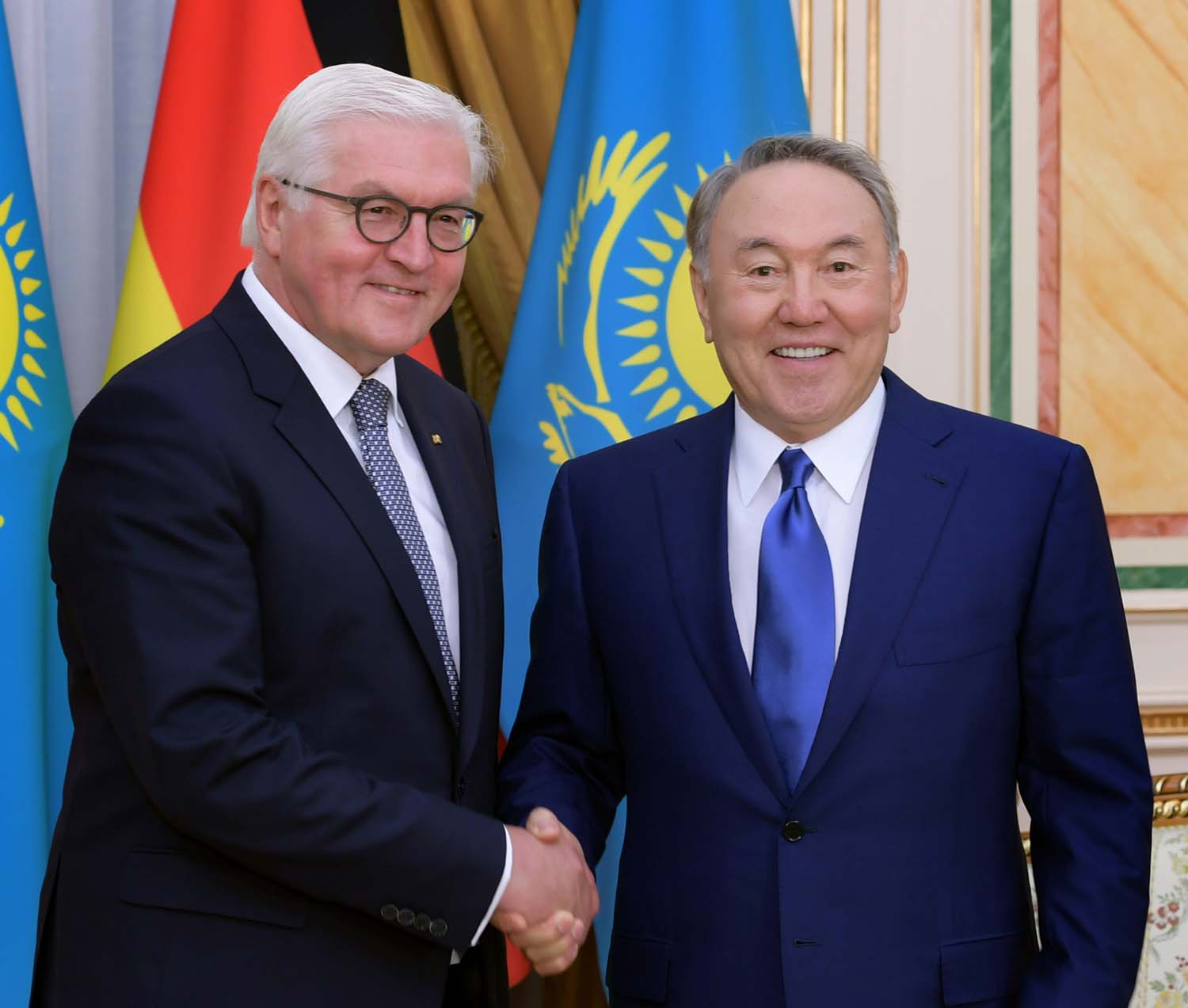Germany’s President Frank-Walter Steinmeier paid an official two-day visit to Kazakhstan this week to deliberate a wide range of issues of bilateral collaboration, including political and economic cooperation, energy and transport partnership at high-level meetings with top Kazakh officials in Astana.
“Germany is our reliable friend and key economic partner,” Kazakhstan’s President Nursultan Nazarbayev said at a press briefing following a meeting Wednesday with Steinmeier. “Today we are entering the level of strategic partnership on the widest spectrum of political and economic relations.”
In what was his first official trip to Kazakhstan as a president, Steinmeier met with Nazarbayev and visited the German and Kazakhstani pavilions at EXPO 2017, the world’s fair currently underway in Astana whose theme is “Future Energy.” The Expo, which opened on June 10, runs through September 10.
Prior to Steinmeier’s visit, the Kazakh-German Business Council for Strategic Cooperation met to sign 21 memorandums plus a commercial agreement valued at over $990 million, mostly centered on energy efficiency.
Kazakhstan is ranked as Germany’s fourth largest supplier of oil and also exports metals and pharmaceuticals. In turn, Kazakhstan absorbed $1 billion of German goods out of a total of $1.2 trillion in German exports worldwide.
Germany’s investments in Kazakhstan involve more than 900 different enterprises, with capital invested in 2016 amounting to more than $4 billion. Berlin views Kazakhstan as a potential market for its energy efficient technologies as well as a gateway to markets further eastward in Asia, including China, where it is looking to increase its exports in motor vehicles, machinery, chemical products, electronics and electric equipment, food products, basic metals, and plastics.
Straddling both the Caspian and Central Asia regions, Kazakhstan occupies a strategic location along some of the largest East-to-West and North-to-South transportation routes, including avenues to India.
“Given the favorable geographical location of Kazakhstan, we intend to join efforts to further advance the idea of land transportation of goods from China through Central Asia to Germany,” Nazarbayev said on Wednesday.
Having been part of the ancient Silk Road, Kazakhstan is poised to once again benefit from trade routes linking Europe and Asia through China’s mega-shipping and logistics network known as “One Belt, One Road” (OBOR). Just last month Astana and Beijing signed an agreement that linked OBOR with the Kazakhstani infrastructure development initiative called Nurly Zhol, meaning “lighted path” in Kazakh, which connects Kazakhstan’s remote regions to intercontinental trade and transportation routes.
OBOR, the transportation mega-project is supposed to connect Asia to Europe and Africa via a series of shipping lands and land routes, some of which cross the Kazakh steppes.
Multiple high-speed rail networks and massive ports across Asia and Africa will require movement through Kazakhstan’s steppes, as free trade zones are formed that are expected to encompass more than 60 countries and $21 trillion in the global gross domestic product (GDP).
“We hope that this initiative, which in the historical past was not only an infrastructure project, but also served as a cultural bridge between peoples, will now be considered not only from the standpoint of investment attractiveness, but will also serve as a real rapprochement between East and West,” Germany’s president stressed at Wednesday’s press briefing in Astana. “I am confident that, situated between China and the West, Kazakhstan will play a big role in this process.







 Russian peacekeeping forces, deployed in the Karabakh (Garabagh) region of Azerbaijan since 2020, have commenced their withdrawal from the area.
Russian peacekeeping forces, deployed in the Karabakh (Garabagh) region of Azerbaijan since 2020, have commenced their withdrawal from the area.
 Iran's senior military leaders described the drone and missile attack on Israel on April 14 night as “successful".
Iran's senior military leaders described the drone and missile attack on Israel on April 14 night as “successful".
 Azerbaijan officially unveiled the logo for the upcoming 29th session of the Conference of the Parties to the United Nations Framework Convention o...
Azerbaijan officially unveiled the logo for the upcoming 29th session of the Conference of the Parties to the United Nations Framework Convention o...
 Iranian President Ebrahim Raisi warned Israel that it would face a "real and extensive" response if it makes any "mistake" following Tehran’s missi...
Iranian President Ebrahim Raisi warned Israel that it would face a "real and extensive" response if it makes any "mistake" following Tehran’s missi...



